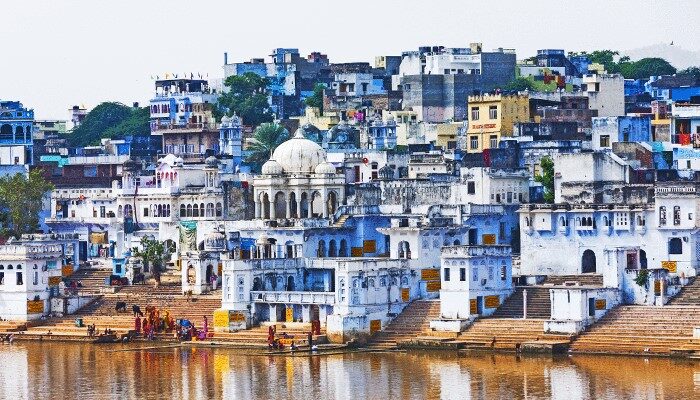
Posted in India on October 12, 2016
From Oct. 8 to 22, 2016, the Softchoice Cares board was volunteering in Rajasthan, India with Jatan Sansthan. The team worked to update two computer labs that Softchoice Cares built in 2015, and train locals from the community, particularly kids, on how to use them. And, of course, there were adventures along the way.
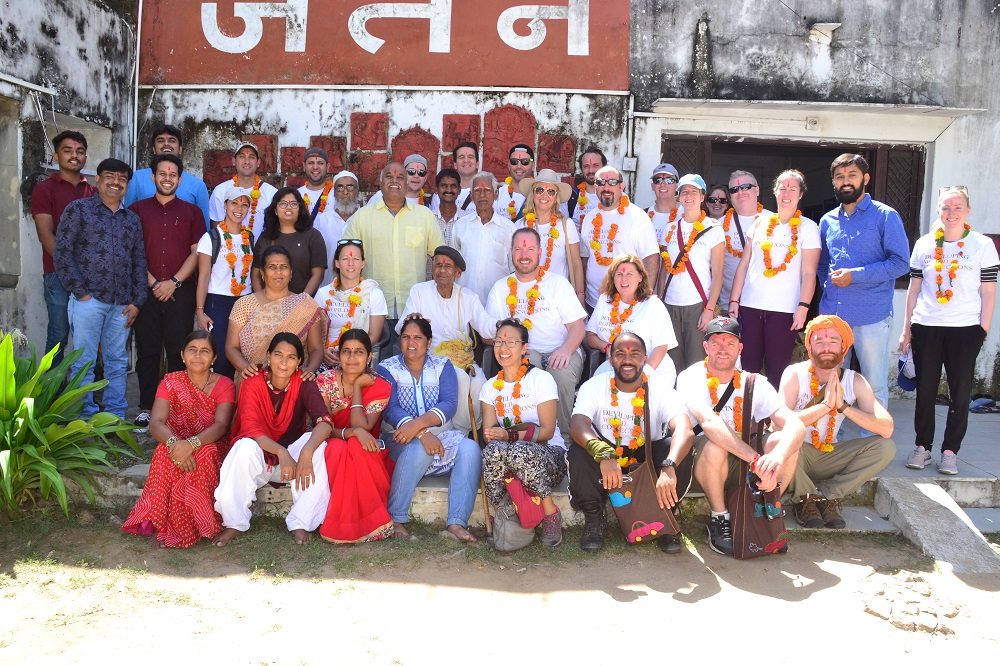
October 22: Last day
By Brittany Pepper, Softchoice Cares board member (Oakville, ON)
Our world is an incredible place. It seems so obvious, but sometimes it is hard to see the beauty through the noise. Rajsamand, India is no different.
At first encounter, this place is a chaotic collection of smells, sights, sounds, garbage, clutter and cows. But when you look closer, the chaos is more of a symphony. A collection of bright colors, rich culture and people who connect deeply with the land and country around them.
The people, animals and communities rely on each other to survive and thrive. A cow eats the waste from a family’s rich-flavored, veggie-based dinner who in turn provides milk for masala chai. There is a symbiosis to life that allows these rural livelihoods to be sustained. Each piece of the seemingly chaotic daily life is connected like an intricate jigsaw puzzle. The puzzle is big, bold and beautiful, but it is still missing pieces — the pieces that will bring their rural livelihoods access to more opportunities.
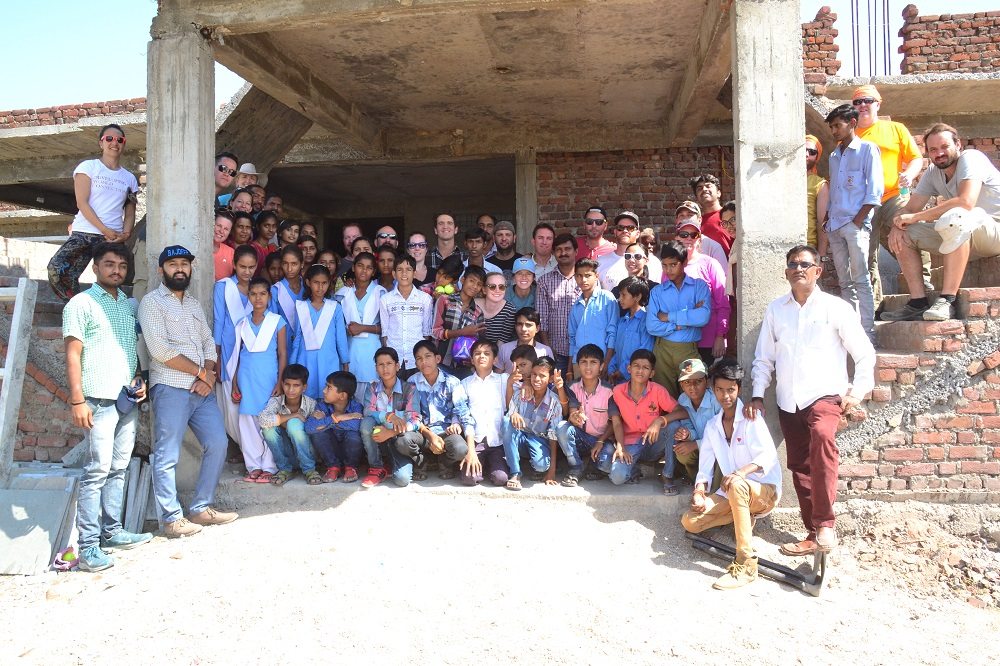
We leave here providing another piece of the puzzle for these communities. The opportunity to connect to the broader world around them through the internet and to share their way of life with the world. The opportunity to learn ways to connect with people and places far beyond their rural village. The opportunity to build on a foundation of rich history, humanity and humility, and be the future of our world. I see the potential here and the technology we have provided is simply a catalyst for the bright future that, to me, is inevitable.
As we wrap up our time in India, I look back at the two weeks: 22 people, 20 laptops, 8,600 bricks laid, 12,600 pounds of sand for cement, one impromptu wedding (congrats to the Bussieres!), roughly 1,000,000 cows, and the realization that there is no way for any numbers to tell the story.
The true story of our success is the look of wonder on the faces of children using a computer for the first time, the local women having a sense of hope their daughters will have new opportunities, the feeling of pride when an entire community chants “Thank you, Softchoice!” because they now know that people half way across the world care about their future.
We are now a piece of their local puzzle, and we leave India with an even bigger Softchoice family.
October 20: First experiences with a computer
By Darryl Cress, Softchoice Cares board member (Seattle, WA)
A group of local kids – girls and boys from the nearby villages – came to the school today. We took a break from hauling bricks and sand to join them in the computer lab that we’ve set up for them. What I saw when they got their hands on the PCs we brought to India was a bit surprising and extremely gratifying. They jumped on the computers. They devoured them!
I probably should have expected it. Looking back on the first time I got to use a computer by myself (for the record, it was an Apple IIe), I was just as excited. The kids were all over the computers, opening apps like GIMP (a photo editing app) and Google Earth with visible fascination. One boy, on zooming out from Earth in Celestia, gasped “Wow!” as he shot past the moon. It was awesome!
A lot of time and effort and, frankly, money went into bringing this tech to India. Everybody on the board carried an extra PC and camera and all the related peripherals from their home to Nathdwara, and then out to the school. At some point this became just a series of tasks to me, part of the project. Today was the payoff.
I absolutely saw my younger self in those kids, giddy with excitement to have their hands on the mouse and keyboard, with access to all those apps and with broadband internet access coming soon.
We ended the workday back in the Rajasthan heat, shifting a few more bricks. Those kids and their smiles will stick with us long after the concrete has set.
October 18: This is why we’re here
By Krista Ocker, Softchoice Cares board member (Denver, CO)
Today was a good day, though, it didn’t start out that way.
We’re into our sixth day of building and the manual labor, heat and physical exertion is starting to wear on our bodies as well as our minds. The honeymoon is officially over! Almost everyone is a little homesick and physically, some of us are in pretty rough shape. However, one member of the team suggested a quote as the theme for the day: “The best way to find yourself, is to lose yourself in the service of others.”
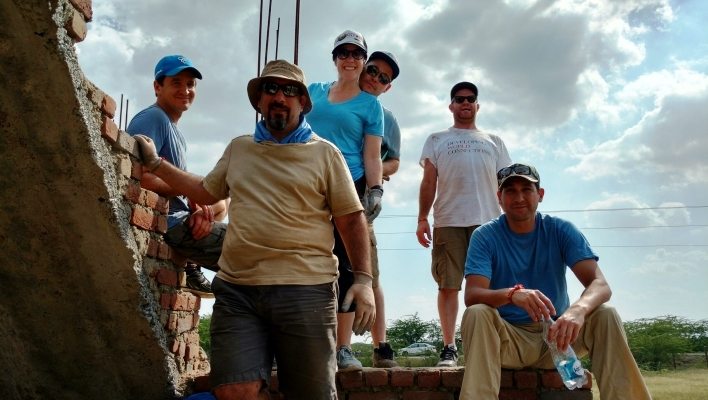
This was clearly demonstrated when roughly 40 kids came to the e-lab today and were shown the basics of using the computers. Some of the children were clearly old pros, however, I had the benefit of working with two young boys who had never seen a computer, let alone used one.
It was so amazing to watch these boys quickly learn to move a mouse, double click, and open a picture that they had just taken on the digital cameras that we brought from home. Their faces lit up with joy and a little awe when they opened a picture of themselves. If nothing else, we’ve taught them the important skill of the selfie!
We followed the session with more than an hour of questions from the kids, who were curious about many different aspects of North American culture. How do we elect our president/prime minister? What does our currency look like? How many states or provinces are in our home countries? What famous places are near our homes? The thing that struck me most was that once connected to the internet, these kids will have the ability to find these answers for themselves.
This is why we’re here. This is why we are spending hours each day throwing bricks, mixing cement (fondly coined masala) by hand, and bending over the walls that are slowly growing row by row. This is why my back hurts. And you know what? It’s awesome!
October 17: So many differences, so much the same
By Maris Benz, Softchoice Cares board member (Chicago, IL)
When I travel – in the back of my mind, as a sort of mental checklist – I always ask the questions what is different? and what is the same?
Is the food similar? No. Is the climate the same? No. Do they drive on the same side of the street? Nope. When we head out to the Jatan Sansthan site – where we’re helping to build an e-lab – we take a different route every day, as we hasten through different towns and around herds of cows, water buffalo, motorcycles, cows, goats and some others.
I am both the furthest from the U.S. Midwest I’ve ever been, and the furthest away from my cultural norm.
Today, however, the folks at Jatan Sansthan took us around to state-sponsored preschool sites in the area, where I had successive moments of seeing the similarities between India and home.
The schools are for kids ages one through six, and are designed to assist local parents in making sure their kids are given opportunities to succeed. At these sites, the kids are given their immunizations, a good meal and an early education.
The teacher tried to get the kids to sing to us with limited success. Two boys beamed and sang while the others cowered from us. Upon reflection, I can understand their confusion, as the 20 of us crowded into their small yet brightly painted classroom and sang Itsy Bitsy Spider to them.
We then returned to the build site to sling some more bricks, while my colleague and fellow Softchoice Cares board member Kathleen D’Sylva walked a dozen or so people from the local area through the basics of how to use a computer.
Afterward, we were able to speak to them and through the hard work of our translator, asked each other questions. One man asked what we had learned in our time here. Craig Taylor, our partner sponsor from Lenovo, responded saying that despite all our differences, how similar we are to one another.
While an insignificant moment in the course of our conversation with them, it was affirming to know we’re on the same page – seeing all the differences, yet seeing past that to what we all have in common with one another.
October 14: Some issues are universal
By Kathleen D’Sylva, Softchoice Cares board member (Oakville, ON)
We have just wrapped up our first work week in India. The computer lab is set up and we will start training on Monday.
The walls on the second floor are coming up nicely. We have had an opportunity to parge (plaster using concrete) exterior walls. Our Jatan Sansthan contact, Rajdeep, emphatically commented that we are exceeding expectations! Our work is inhuman, in fact, paranormal!
I, however, don’t think there are any construction workers out there who need to feel threatened their jobs are being jeopardized.
Today was wrapped up with a visit to the Kuraj area panchayat (village council) where we attended a meeting with the local elected women representatives to discuss various social issues. While we were there, the head of the panchayat approved a proposal to build a community bathroom.
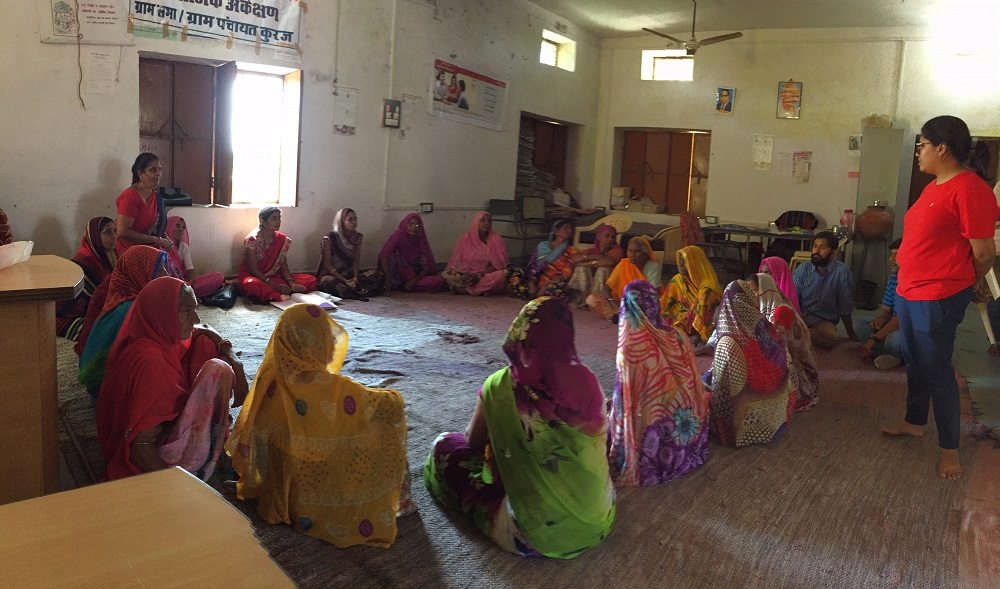
The women shared their concerns with us regarding education and job opportunities for the female population within their communities. They also passionately voiced their concerns regarding violence against women and female infanticide. One woman, with a wry smile, shared that one of her daily struggles was cooking meals morning, noon and night.
We all laughed. Some issues are universal. It has been a good week.
October 13: Tying it all together
By Nicole Howard, Softchoice Cares board member (Chicago, IL)
Today was our third day working on the computer lab. In the afternoon, a local artisan came by to show us the art of tie-dye and block printing on cloth. This wonderful man has a heritage in tie-dye. His family has been doing this for over 700 years.
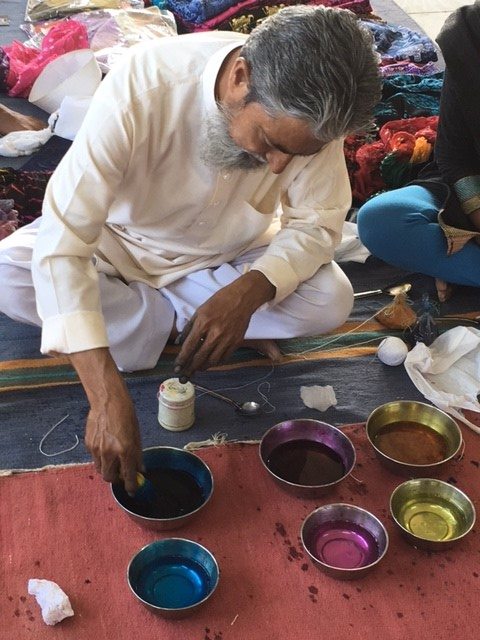
Thinking of that in the context of North America, 100 years, ago we were still settling and immigrating throughout the continent. India has history and traditions that go back so much further than we can imagine.
I was inspired by the art of tie-dye, or as they say here, tie and dye. You start with a blank canvas and begin twisting and tying various parts of the cloth into something that looks like origami on fabric.
You wonder, how could this possibly result in something beautiful as a finished product? Yet before our eyes, various parts of the fabric are dipped in the primary colors, re-dipped, wrung out, and then unraveled. Low and behold, a piece of custom art with meaning and wonder is ours to enjoy.
Funny how this can translate to our e-lab project here in India. The prior Softchoice Cares board came to a blank canvas (the fabric if you will), and began building the structure. Now we are here, continuing the work of finishing the structure and starting the second floor (the twisting and tying).
How will this end up? What impact will it have? That’s the finished product that we know will appear, exactly like the tie-dye handkerchief work of art we created today.
Our work won’t be done when our board leaves India next week, but I know a work of art has been started. And as it unravels to reveal the change and impact that access to technology can make, we know it’s going to change the lives of so many.
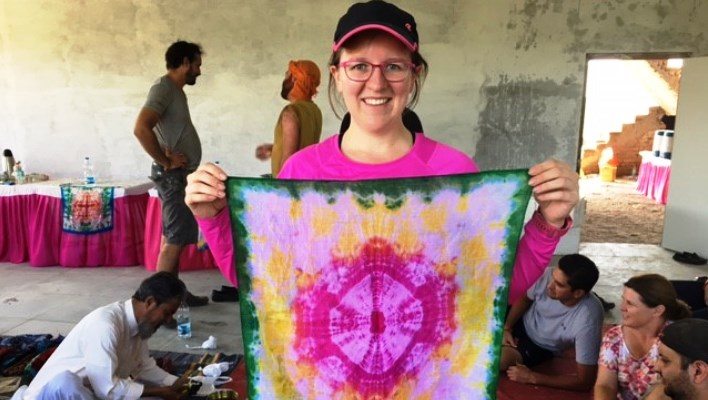
This all reminds me of a favorite Steve Jobs quote:
“You can’t connect the dots looking forward, you can only connect them looking backwards. So you have to trust that the dots will somehow connect in your future. You have to trust in something – your gut, destiny, life, karma, whatever. Because believing that the dots will connect down the road will give you the confidence to follow your heart even when it leads you off the well-worn path. And that will make all the difference.”
October 12: Another Brick in the Wall
By Kathleen Simard, Softchoice Cares board member (Philadelphia, PA)
A difficult task! Today we continued building brick walls. Tossing bricks, hauling sand, mixing mortar and laying the bricks one at a time in the blazing Indian sun. This is how we spent the first six hours of the day today. It’s gruelling work, but we got better at it today and the wall grew faster.
On the way home we visited Child Line, a public service helpline started in 2016 that provides support and protection for children being abused here in Rajasthan. As we listened to their stories, it was hard not to feel overwhelmed by all the barriers that stand in the way of reaching and helping these children. But just like our wall – one brick at a time, one child at a time – they have taken steps forward and started to help.
This year, they have made a difference in the lives of 97 children, but that’s 97 out of a local population of 69 million. It feels like a drop in an ocean until you realize that this year they’ve helped 97 more than last year. That’s 97 children who may have a chance at a different outcome. We may not finish our walls during this trip, and they won’t reach all the children that need help, but people coming together to start something is a positive beginning.
October 11: Arrival in Rajsamand
By Bradley Peacock, Softchoice Cares board member (Toronto)
Today was our first day on site. After an hour and a half drive through the countryside, we were looking at a roughly finished brick and mortar, single story building at the end of a dirt track. In the yard there were three heaps of bricks, a pile of gravel and another of sand. All of it needs to get onto the roof.
Before we arrived, we spent a few hours of our morning with the Jatan Sansthan team, who welcomed us with flowers and tilak, and told us about the work that they’re doing with the rural population of Rajasthan (which includes the area that we’re working in, Rajsamand).
Jatan has a varied list of initiatives aimed at empowering the local population, specifically women and youth, and focused on community involvement to ensure that people of all social standing are involved, empowered and served equally. Walking away, I had no idea how pertinent communal involvement would play into the rest of our day.
Back to those bricks and sand. How do you get those onto the second story of a building when there’s no forklift, no crane, no anything? There’s really nothing but us and our willpower.
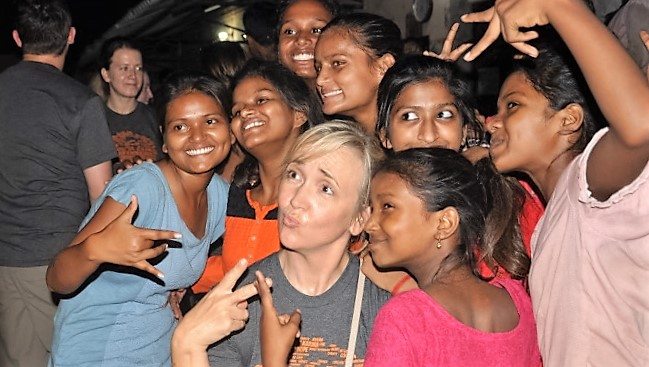
Hand to hand, brick by individual brick, a team of five people can move and stack 15 bricks a minute from the ground, up a set of stairs, and onto what will soon be the first floor of the eLab we’re helping to build. It’s like one of those bucket brigades that you’d see in a Saturday morning cartoon when you were a kid, except instead of a cartoon characters trying to put out a fire, Mike Di Fonzo is catching bricks from the person below him, and then throwing them at me to catch and stack. Seriously, hundreds of bricks thrown from hand to hand onto the second floor over the course of several hours. Sometimes we had two brick brigades going at once!
Meanwhile, others in our group are mixing sand and concrete to make mortar (which they call masala). To get that sand onto the roof, they fill bowls one at a time and carry them across the yard, lift them over their head, handing them to someone halfway up the stairs, who lifts them up further, passing them onto another person on the roof. Eventually you have a pile of sand ‘30 bowls’ deep. You then hand mix that pile with a bag of concrete and water to create mortar. The wet mortar is then scooped into the sand bowls and moved one by one over to where others are laying bricks down to create the second floor wall.
With that in mind, I got to see my wife laying bricks today and I took a picture that I’m going to frame and possibly put on my fridge. My wife does not lay brick (and in fairness, she should probably frame a pick of me catching bricks, because as much as I enjoyed it, it’s not something that you’ll catch me doing every day). At the end of the day, through an amazing communal effort, we had more than enough bricks on the roof and had completed three courses of a new second story wall.
If anyone else had written this post, they would probably have a totally different story of what got done and how (I didn’t even get to the fact that another team set up an entire first floor eLab!), but I think in the end all of us walked away knowing that through teamwork and communal determination, we did something amazing. And today was our first day!
This is an amazing group of highly dedicated and determined people (from the local community, and my colleagues) and I’m definitely looking forward to the next two weeks to see what we can get done together.
October 10: Robin Hood Army
By Matthew Wolf, Softchoice Cares board member (Seattle, WA)
Delhi is, in a word, intense. Even if you’ve been here before, it’s impossible to be truly prepared for the sheer cacophony of sights, sounds, and smells that lay coiled and ready to pounce just outside the airplane door.
The air smells of motor oil cooked in butter served with a side of burnt aluminum. Traffic flows like a herd of wildebeest evading a lion – well-ordered, panicked chaos. Stray cattle lazily roam the streets of this dense metropolitan area along with goats and dogs, and more people than the human mind can reasonably be expected to imagine.
I’ll give you a number anyway – 25 million. Delhi is a city of 25 million people, which is many, many millions more than its infrastructure or economy are able to support. At home, we speak of people slipping through the cracks. To extend that metaphor to Delhi we’d have to describe vast swaths of people falling through gaping fissures in the Earth itself.
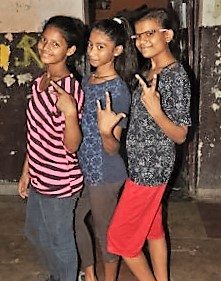
Unfortunately, many of those people are children. Parents die, leaving children to fend for themselves. Some children are simply abandoned by parents unable to care for them.
Last night we were able to witness first-hand the silver lining to this dark cloud.
We visited a girls’ orphanage in one of the poorer parts of Delhi with an organization called Robin Hood Army; an all-volunteer organization that gathers uneaten food from restaurants and distributes it to those in need around the city.
What we witnessed at this orphanage was a true testament to the human spirit. More than 100 young girls with tragic stories who were happier than any children I’ve ever seen. They danced with us, sang happy birthday to their friend, giggled, played and smiled, and showed us where they slept and ate and learned with glowing pride on their faces. They have almost nothing and almost nobody, but they’ve found a way to live a life full of joy.
In our world of instant gratification and endless trite first-world problems, I think we all have a lot to learn from these girls.
We’re heading out for our first day of work on the computer lab tomorrow. Look for another update soon. Namaste!
October 8: Arrival in Delhi
By Joshua Bussiere, Softchoice Cares board member (Chicago, IL)
The equivalent of one day… or more. That was travel time (plus the time difference) for our Softchoice Cares board members who made the trek today from North America to the city of Delhi – India’s capital.
From Toronto, a 13.5-hour flight and a 9.5-hour time difference. From Chicago, a 14.5-hour flight and 10.5-hour time difference. From Seattle, first a flight to Dubai in the United Arab Emirates, then to Delhi (16.5 total hours) and a 12.5-hour time difference.
Yet, it all went by in a flash. The excitement we feel to be here is matched only by our enthusiasm to get started on the lab in Rajsamand!
A picture of our surroundings for those at home.
The streets in Delhi are full of life. From cars, trucks, motorcycles, mopeds, bicycles, and rickshaws (all that drive entirely too close to the thousands of pedestrians on every street!), to the stray dogs simply looking for their meal for the day, to street merchants and business men, the poor and wealthy alike. All appear to live and move in a harmony difficult for a westerner to grasp.
The shops and restaurants are small, maybe half of what we might expect at home, but filled from wall to wall, floor to ceiling, with suggestions for your rupees (the local currency, an exchange of approximately 65:1 USD and 50:1 CAD).
Today, in the evening, we are volunteering at a local charity known as Robin Hood Army. It’s an organization that acquires surplus food from restaurants to support abandoned, homeless and runaway children.
Tomorrow, we leave for Udaipur, which is a major metropolitan area just southwest of the capital. Namaste!
Posted in India on October 12, 2016



